20 start with C start with C

Listen to a short interview with Rawi AbdelalHost: Chris Gondek | Producer: Heron & Crane
The rise of global financial markets in the last decades of the twentieth century was premised on one fundamental idea: that capital ought to flow across country borders with minimal restriction and regulation. Freedom for capital movements became the new orthodoxy.
In an intellectual, legal, and political history of financial globalization, Rawi Abdelal shows that this was not always the case. Transactions routinely executed by bankers, managers, and investors during the 1990s--trading foreign stocks and bonds, borrowing in foreign currencies--had been illegal in many countries only decades, and sometimes just a year or two, earlier.
How and why did the world shift from an orthodoxy of free capital movements in 1914 to an orthodoxy of capital controls in 1944 and then back again by 1994? How have such standards of appropriate behavior been codified and transmitted internationally? Contrary to conventional accounts, Abdelal argues that neither the U.S. Treasury nor Wall Street bankers have preferred or promoted multilateral, liberal rules for global finance. Instead, European policy makers conceived and promoted the liberal rules that compose the international financial architecture. Whereas U.S. policy makers have tended to embrace unilateral, ad hoc globalization, French and European policy makers have promoted a rule-based, "managed" globalization. This contest over the character of globalization continues today.
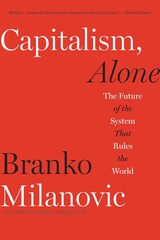
An Economist Book of the Year
A Financial Times Book of the Year
A Foreign Affairs Best Book of the Year
A Prospect Best Book of the Year
A ProMarket Book of the Year
An Omidyar Network “8 Storytellers Informing How We’ve been Reimagining Capitalism” Selection
“Brilliant…Poses all the important questions about our future.”
—Gordon Brown
“A scholar of inequality warns that while capitalism may have seen off rival economic systems, the survival of liberal democracies is anything but assured.”
—The Economist
We are all capitalists now. For the first time in human history, the world is dominated by one economic system. At some level capitalism has triumphed because it works: it delivers prosperity and gratifies our desire for autonomy. But this comes at a moral price, pushing us to treat material success as the ultimate goal, and offers no guarantee of stability. While Western liberal capitalism creaks under the strains of inequality and excess, some are flaunting the virtues of political capitalism, exemplified by China, which may be more efficient, but is also vulnerable to corruption and social unrest.
One of the outstanding economists of his generation, Branko Milanovic mines the data to tell his ambitious and compelling story. Capitalism gets a lot wrong, he argues, but also much right—and it isn’t going away anytime soon. Our task is to improve it in the hopes that a more equitable capitalism can take hold.
“Erudite, illuminating…Engaging to read…As a virtuoso economist, Milanovic is superb when he is compiling and assessing data.”
—Robert Kuttner, New York Review of Books
“Leaves little doubt that the social contract no longer holds. Whether you live in Beijing or New York, the time for renegotiation is approaching.”
—Edward Luce, Financial Times
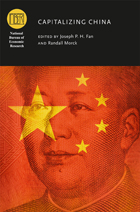
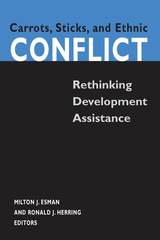
These issues are addressed comparatively by area specialists and participant-observers from development assistance organizations. This book is the first systematic effort to evaluate this dimension of international affairs--and to propose remedies. Case studies include Russia, Ecuador, Sri Lanka, and Kenya, with references to many other national experiences.
Cross-cutting chapters consider evolution of USAID and the World Bank's policies on displacement of people by development projects, as well as how carrots and sticks may affect ethnic dynamics, but through different mechanisms and to varying degrees depending on political dynamics and regime behaviors. They show that projects may also exacerbate ethnic conflict by reinforcing territoriality and exposing seemingly unfair allocative principles that exclude or harm some while benefiting others.
For students of international political economy, development studies, comparative politics, and ethnic conflict, this book illuminates a problem area that has long been overlooked in international affairs literature. It is essential reading for staff members and policymakers in development assistance agencies and international financial institutions.
Milton J. Esman is the John S. Knight Professor of International Studies, Emeritus, and Professor of Government, Emeritus, at Cornell University.
Ronald J. Herring is Director of the Mario Einaudi Center for International Studies at Cornell, the John S. Knight Professor of International Relations, and Professor of Government at Cornell University.

A groundbreaking feminist perspective on Movimiento al Socialismo (MAS) rule in Bolivia and the country’s radical transformation under Evo Morales
The presidency of Evo Morales in Bolivia (2006–2019) has produced considerable academic scholarship, much of it focused on indigenous social movements or extractivism, and often triumphalist about the successes of Morales’s Movimiento al Socialismo (MAS). Turning a new lens on the movement, Cash, Clothes, and Construction presents the first gender-based analysis of “pluri-economy,” a central pillar of Bolivia’s program under Morales, evaluating the potential of this vision of “an economy where all economies fit” to embrace feminist critiques of capitalism and economic diversity.
Based on more than twelve years of empirical research exploring the remarkable transformations in Bolivia since 2006, this book focuses on three sectors—finance, clothing, and construction—in which indigenous women have defied gendered expectations. Kate Maclean presents detailed case studies of women selling secondhand high street clothes from the United States in the vast, peri-urban markets of Bolivian cities; Aymaran designers of new pollera (traditional Andean dress) fashions, one of whom exhibited her collection in New York City; and the powerful and rich chola paceña, whose real estate investments have transformed the cultural maps of La Paz and El Alto.
Cash, Clothes, and Construction offers a gendered analysis of the mission of MAS to dismantle neoliberalism and decolonize politics and economy from the perspective of the Indigenous women who have radically transformed Bolivia’s economy from the ground up.
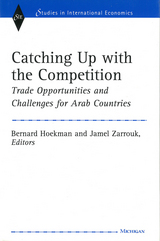
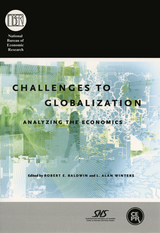
Challenges to Globalization evaluates the arguments of pro-globalists and anti-globalists regarding issues such as globalization's relationship to democracy, its impact on the environment and on labor markets including the brain drain, sweat shop labor, wage levels, and changes in production processes, and the associated expansion of trade and its effects on prices. Baldwin, Winters, and the contributors to this volume look at multinational firms, foreign investment, and mergers and acquisitions and present surprising findings that often run counter to the claim that multinational firms primarily seek countries with low wage labor. The book closes with papers on financial opening and on the relationship between international economic policies and national economic growth rates.
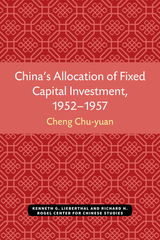
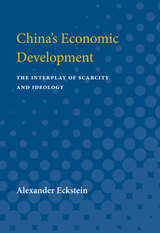
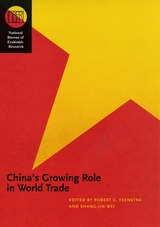
Bringing together an expert group of contributors, China's Growing Role in World Trade undertakes an empirical investigation of the effects of China's new status. The essays collected here provide detailed analyses of the microstructure of trade, the macroeconomic implications, sector-level issues, and foreign direct investment. This volume's careful examination of micro data in light of established economic theories clarifies a number of misconceptions, disproves some conventional wisdom, and documents data patterns that enhance our understanding of China's trade and what it may mean to the rest of the world.
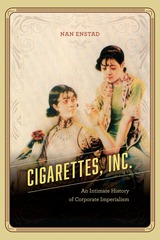
In this startling account of innovation and expansion, Enstad uncovers a corporate network rooted in Jim Crow segregation that stretched between the United States and China and beyond. Cigarettes, Inc. teems with a global cast—from Egyptian, American, and Chinese entrepreneurs to a multiracial set of farmers, merchants, factory workers, marketers, and even baseball players, jazz musicians, and sex workers. Through their stories, Cigarettes, Inc. accounts for the cigarette’s spectacular rise in popularity and in the process offers nothing less than a sweeping reinterpretation of corporate power itself.
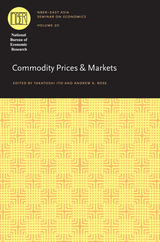
Fluctuations of commodity prices, most notably of oil, capture considerable attention and have been tied to important economic effects, such as inflation and low rates of economic growth. Commodity Prices and Markets advances our understanding of the consequences of these fluctuations, providing both general analysis and a particular focus on the countries of the Pacific Rim. The volume addresses three distinct subjects: the difficulties in forecasting commodity prices, the effects of exogenous commodity price shocks on the domestic economy, and the relationship between price shocks and monetary policy. The ability to forecast commodity prices is difficult but of great importance to businesses and governments, and this volume will be invaluable to professionals and policy makers interested in the field.
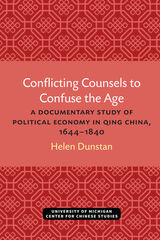
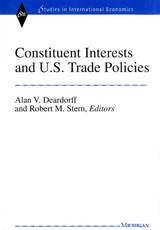

Harold James examines the vulnerability and fragility of processes of globalization, both historically and in the present. This book applies lessons from past breakdowns of globalization—above all in the Great Depression—to show how financial crises provoke backlashes against global integration: against the mobility of capital or goods, but also against flows of migration. By a parallel examination of the financial panics of 1929 and 1931 as well as that of 2008, he shows how banking and monetary collapses suddenly and radically alter the rules of engagement for every other type of economic activity.
Increased calls for state action in countercyclical fiscal policy bring demands for trade protection. In the open economy of the twenty-first century, such calls are only viable in very large states—probably only in the United States and China. By contrast, in smaller countries demand trickles out of the national container, creating jobs in other countries. The international community is thus paralyzed, and international institutions are challenged by conflicts of interest. The book shows the looming psychological and material consequences of an interconnected world for people and the institutions they create.


How can Cuba address the challenges of economic development and transformation that have bedeviled so many Latin American and Eastern European countries? What are the universally common macroeconomic and societal challenges it faces and the specific peculiarities that have emerged after a decade-long transformation of its economy?
For the Cuban and American social scientists and policy experts writing in this timely and provocative volume, the answer lies in examining Cuba’s development trajectory by delving into issues ranging from the political economy of reform to their impact on specific sectors including export development, foreign direct investment, and U.S.–Cuba trade. Moreover, the volume also draws attention to the intersection between economic reform and societal dynamics by exploring changes in household consumption, socioeconomic mobility, as well as remittances and their effects, while remaining steadfast in its focus on their policy implications for Cuba’s future.

After providing background information on Cuba's prerevolutionary economy, Brunner explores the effects of Communist ideology and the U.S. embargo on the country's resources and trade, and analyzes the problems Cuba faced in shifting from trade with the U.S. to trade with the Soviet Union and Soviet bloc. He evaluates their implementation of the development plan, assessing the sugar industry within Cuba as well as how its accelerated development affected the rest of the domestic economy.
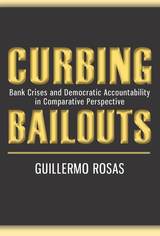
"Rosas's compelling theory and wide-ranging empirical evidence yield a persuasive but surprising conclusion in light of the financial meltdown of 2008–9. In the event of banking crises, not only do elected governments treat taxpayers better and force bankers and their creditors to pay more for their mistakes, but bankers in democracies are more prudent as a consequence . . . essential reading for all interested in the political economy of crisis and in the future of banking regulation."
---Philip Keefer, Lead Economist, Development Research Group, The World Bank
"Rosas convincingly demonstrates how democratic accountability affects the incidence and resolution of banking crises. Combining formal models, case studies, and cutting-edge quantitative methods, Rosas's book represents a model for political economy research."
---William Bernhard, Professor, Department of Political Science, University of Illinois
"When the financial crises of the 1990s hit Asia, Russia, and Latin America, the U.S. scolded them about the moral hazard problems of bailing out the banks. Now, the shoe is on the other foot, with the U.S. struggling to manage an imploding financial sector. Rosas's study of bank bailouts could not be more timely, providing us with both a framework for thinking about the issue and some sobering history of how things go both right and badly wrong. Democratic accountability proves the crucial factor in making sure bailouts are fair, a point that is as relevant for U.S. policy as for an understanding of the emerging markets."
---Stephan Haggard, Krause Professor, Graduate School of International Relations and Pacific Studies, University of California, San Diego
Banking crises threaten the stability and growth of economies around the world. In response, politicians restore banks to solvency by redistributing losses from bank shareholders and depositors to taxpayers, and the burden the citizenry must bear varies from case to case. Whereas some governments stay close to the prescriptions espoused by Sir Walter Bagehot in the nineteenth century that limit the costs shouldered by taxpayers, others engage in generous bank bailouts at great cost to society. What factors determine a government's response?
In this comparative analysis of late-twentieth-century banking crises, Guillermo Rosas identifies political regime type as the determining factor. During a crisis, powerful financial players demand protection of their assets. Rosas maintains that in authoritarian regimes, government officials have little to shield them from such demands and little incentive for rebuffing them, while in democratic regimes, elected officials must weigh these demands against the interests of the voters---that is, the taxpayers. As a result, compared with authoritarian regimes, democratic regimes show a lower propensity toward dramatic, costly bailouts.
Guillermo Rosas is Assistant Professor in the Department of Political Science and Fellow at the Center in Political Economy at Washington University in St. Louis.
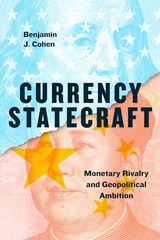
In a comprehensive review that ranges from World War II to the present, Cohen convincingly argues that one goal stands out as the primary motivation for currency statecraft: the extent of a country’s geopolitical ambition, or how driven it is to build or sustain a prominent place in the international community. When a currency becomes internationalized, it generally increases the power of the nation that produces it. In the persistent contestation that characterizes global politics, that extra edge can matter greatly, making monetary rivalry an integral component of geopolitics. Today, the major example of monetary rivalry is the emerging confrontation between the US dollar and the Chinese renminbi. Cohen describes how China has vigorously promoted the international standing of its currency in recent years, even at the risk of exacerbating relations with the United States, and explains how the outcome could play a major role in shaping the broader geopolitical engagement between the two superpowers.
READERS
Browse our collection.
PUBLISHERS
See BiblioVault's publisher services.
STUDENT SERVICES
Files for college accessibility offices.
UChicago Accessibility Resources
home | accessibility | search | about | contact us
BiblioVault ® 2001 - 2024
The University of Chicago Press









